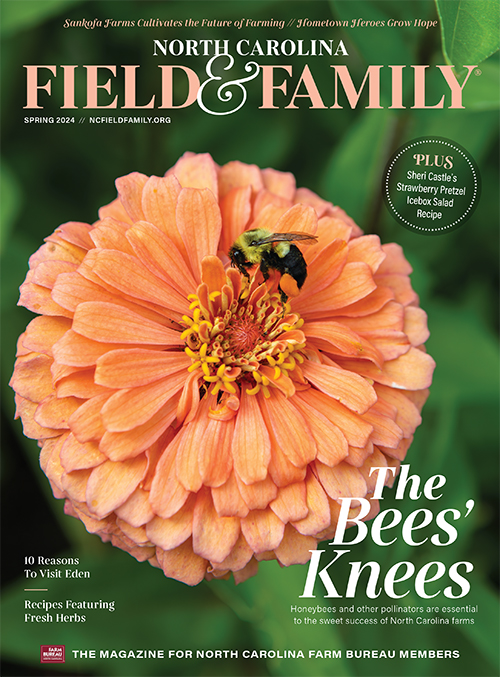Kamal Bell of Sankofa Farms Is Inspiring a New Generation of Black Farmers
Sankofa Farms in Efland has made a name for itself as a place that not only grows healthy food but also teaches the next generation how to grow it.
Tathel Miller |
Sankofa Farms in Efland has made a name for itself as a place that not only grows healthy food, but also teaches the next generation how to grow it. In fact, the name itself, Sankofa, refers to the importance of learning from the past to build the future, according to the African American Cultural Center at NC State University.
“I was very intentional when I named the farm,” says founder Kamal Bell, noting that the word has ties to the Akan tribe of West Africa. “I want to leverage our history and build and serve people of African descent.”

While a graduate student at N.C. A&T State University, Bell learned about food deserts and the lack of healthy foods in many rural and urban areas.
“I saw how food intersects with all areas of life like education, community, culture and socioeconomic factors,” Bell says. “And rather than seeing it as an injustice, I decided to do something about it.”
That he did. After graduating with a bachelor’s degree in animal science and a master’s in agricultural education, Bell served as a middle school Earth and environmental science teacher for four years. He focused on introducing the importance of gardening to his students but eventually decided to expand his work as an educator.

Sankofa Farms Teaches Agriculture and Life Lessons
In March 2016, he purchased 12 acres in Cedar Grove, with a vision of addressing the needs of minorities living in food deserts as well as educating young Black students through a year-round program. The Sankofa Farms Agricultural Academy began the following summer.
Today, the academy serves African American boys from the ages of 11 to 17 and focuses on the significance of science, technology, engineering and mathematics (STEM) and their relationship to regenerative farming, in addition to careers in agriculture. It also teaches life skills and career readiness to improve earning wages, along with stressing the importance of academic success while in school.
“We have made the program a model of a healing place where the boys can come to the farm and then they can go back out in society and find their purpose as well,” Bell says. “We hope in the future to include adults in these programs.”
See more: Flat Farmer Educational Program Teaches Kids About Agriculture

A Buzzworthy Mission
Honeybees are also a vital part of Sankofa Farms. On any given day, Bell’s young sons and the agricultural academy students can be found working in the apiary, which has 40 beehives. All the children learn more about apiculture and the relationship between pollinators and the crops grown on the farm.
“We have found that learning how to become a beekeeper is a great introductory activity for our students,” Bell says.
Under the leadership of Bell and his wife, Amber, Sankofa Farms has grown a strong presence in the urban and rural areas of Durham and Orange County, where they serve minorities who are affected by food deserts. They grow tomatoes, peppers, squash, kale, chard, arugula, spinach, celery, cucumbers, zucchini and more.
“We offer CSA packages, sell at Weaver Market and we partner with Table, an organization in the area that feeds kids in Orange County,” Bell says. “We partner with a few local churches as well.”
See more: Ag Research Helps N.C. Farmers Feed More People on Less Land

While Bell remains humble about his work with the community and the academy, he hopes to instill that same generous spirit in his three young sons.
“I want them to learn they are the light, and they are the change the world needs,” he says. “That they must look within themselves and go and help others.”
See more: Busy Bees: Farmers and Beekeepers Work Together

Learn More
– Tathel Miller



Hello I’m Mr.Lynn there kids or my grandsons call me G-POP, Just wanted to say that proud of my Son-N-Law and Daughter with all the accomplishments they have done along with raising my grandkids with the mindset of independence and working hard , I remember when first starting I was taking trees down to start clearing on the bulldozer and with a background of grading work from my father and heavy equipment operation and an FFA member since 1987 you can see how it was gonna look and be beneficial, and he’s done a whole lot and it looks totally awesome!
And all I have to say is SHOOOOO-YA-RIIIIIIIIITE!
Cause Sankofa Farms is gonna be AWWWWL RIIIIIIITE!
Definitely an example also an asset to the community!!!
Cat wait to see what’s coming in the future!!